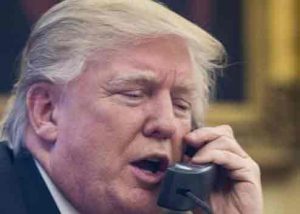
WASHINGTON — It was expected to be a routine phone call between U.S. President Donald Trump and one of Washington’s closest allies.
Instead, last Saturday’s discussion between Trump and Australian Prime Minister Malcolm Turnbull reportedly became heated, spilling into a rare display of public diplomatic disagreement over a deal under which the U.S. would resettle refugees from Australia.
Though the incident is not likely to cause a major crisis in the U.S.-Australia relationship, it amounts to an unforced error for Trump and raises further questions about his management of crucial U.S. alliances in Asia, according to former U.S. defense officials, ex-diplomats and Asia analysts.
“It’s simply hard to understand how pursuing a more antagonistic relationship with the Australian prime minister advances our national objectives,” said Abraham Denmark, who stepped down last month as U.S. Deputy Assistant Secretary of Defense for East Asia.
Many Asian leaders were already alarmed by Trump’s willingness during the presidential campaign to question longstanding U.S. alliances with countries such as Japan and South Korea, which he said are not paying their “fair share” for U.S. protection. Trump’s phone call with Turnbull now seems likely to intensify those worries.
“They’re watching us very closely and there’s a lot of concern among many of our allies that the president seems to see international relations and alliances as highly transactional,” said Denmark, a political appointee under President Barack Obama. “The question for them is … what does the Trump administration expect from us?”
‘Worst deal ever’
The details about the phone call were first outlined in a Washington Post report late Wednesday.
In the conversation, Trump referred to the refugee agreement, reached under Obama, as the “worst deal ever” and accused Turnbull of trying to export the “next Boston bombers,” a reference to the Kyrgyzstan-born attackers who set off bombs during the 2013 Boston marathon.
The discussion was expected to last an hour, but ended after only 25 minutes, according to the report. Afterward, both leaders put their own spin on the conversation.
Turnbull told reporters late Thursday the phone call was “frank and forthright.” He said the U.S.-Australia relationship remains “very strong,” but insisted he will “stand up for Australia in every forum — public or private.”
Trump, attending a national prayer breakfast, addressed the issue indirectly. “It’s time we’re going to be a little tough, folks. We’re taken advantage of by every nation in the world virtually. It’s not going to happen anymore,” he said.[xyz-ihs snippet=”Adsense-responsive”]ll U.S. troops out of Japan and South Korea unless Seoul and Tokyo substantially increase their contributions to the deployment costs.
But Mattis’ message of reassurance risks being undermined by Trump’s unpredictability, says Oba. “Trump is thinking in terms of The Art of the Deal [the title of one of Trump’s books], and he values unpredictability and tension within his internal staff. But what our allies value is commitment, especially in the face of the tremendous security challenges they face.”
Pages: 1 2
